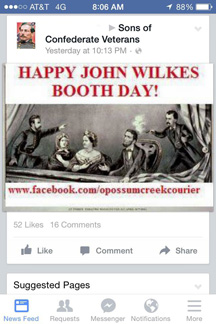Patriotic Booth? “Misguided…Ignorant”
 ECW is pleased to offer a guest commentary from historian and SCV member Chuck Young.
ECW is pleased to offer a guest commentary from historian and SCV member Chuck Young.
April 14, 2015 marked the 150th anniversary of the assassination of President Abraham Lincoln by John Wilkes Booth. While thousands of Americans marked this occasion with respectful remembrance and mourning, there were many who took the opportunity to cheer the event and extoll the courage and patriotism of Booth. As a PROUD Virginian, a descendant of two Confederate veterans, and member of the Sons of Confederate Veterans, it shames me that such misguided, ignorant thought still exists, especially in the “information age” where the facts are readily available.
There is a mythology that grew out of the Confederate defeat during the War Between the States that drew upon pre-war fears and paranoia and matured during the war. It sought to apply blame for the war and subsequent defeat on forces solely outside of the South while also justifying the “Confederate Cause.” Much of this blame was erroneously laid at the feet of Abraham Lincoln.
The Republican Party was created prior to the election of 1856 and was dominated by deep-pocketed Northern abolitionists. The Republicans won many local and state elections that year, making them the main challenger to the well-entrenched Democratic party four years later. Their nominee, Abraham Lincoln, abhorred slavery but was no abolitionist. As a Whig congressman, he supported the resettlement of slaves in Africa rather than integrating them into American society. However, there was a deep hatred of abolitionists in the South due to decades of aggressive agitation and overt hindering the enforcement of the Fugitive Slave Law. With Lincoln’s victory in 1860, many Southern political leaders thought they saw their greatest fears coming to pass: a Federal government openly hostile to the South—despite Lincoln’s statement in his first inaugural address that: “I declare that I have no purpose, directly or indirectly, to interfere with the institution of slavery in the States where it exists. I believe I have no lawful right to do so, and I have no inclination to do so.”
Lincoln did, however, oppose the extension of slavery into the territories, putting him at odds with most of the Southern leadership.
Many claim that it was Lincoln who started the war as a way to subjugate the South and bring an end to its way of life. This flies in the face of the fact that seven Southern states took the first aggressive actions by leaving the United States, forming their own nation (the issue of the legality of Secession is another issue entirely!), and claiming ownership of all Federal property within their states (such as Ft. Sumter in Charleston, SC).
Also, at the time of the Ft. Sumter bombardment, Lincoln had only been in office for little over a month (March 4 to April 12). This begs the question: “What president would seek a war while still trying to establish himself as president?” The answer is: NONE.
However, in an effort to unify the Republican party, half of Lincoln’s cabinet was composed of abolitionists, including Secretary of State William Seward, Secretary of War Simon Cameron, and Secretary of the Navy Gideon Welles. Seward and Cameron had also been Lincoln’s rivals for the presidential nomination and initially thought Lincoln unworthy of the office. These men certainly had the means to influence the events that would lead the nation to war with the Southern states—yet they all maneuvered the waters carefully to avoid firing the first shots. That fell to Southerners.
As further proof that President Lincoln was not attempting to subjugate the people of the South and was, indeed, their friend is the fact that he wanted the people of the South treated with compassion and justice in the post-war years. The lenient terms of surrender offered by General Grant to General Lee at Appomattox were largely the creation of President Lincoln, who conferred with Generals Grant and Sherman and Admiral D. D. Porter near the end of the war. Lincoln also gave his commanders leeway to amend the terms as they saw fit to accommodate the needs of the Confederate forces. Notably absent from that conference was Secretary of War Stanton, whose rancor toward the South was well known; Lincoln intentionally excluded him for this reason.
Also, in March 1865, it was widely believed that the war was near its end and the Union would prevail. In his second inaugural address, the re-elected president called for reconciliation with the Southern states and reunification of the nation in a timely manner. He expressed these sentiments thus:
“With malice toward none, with charity for all, with firmness in the right as God gives us to see the right, let us strive to finish the work we are in, to bind up the nation’s wounds, to care for him who shall have borne the battle and for his widow and orphan, to do all which may achieve and cherish a just and lasting peace among ourselves and with all nations.”
By his words and deeds, President Lincoln certainly deserved a better fate. The South could not have had a better friend.